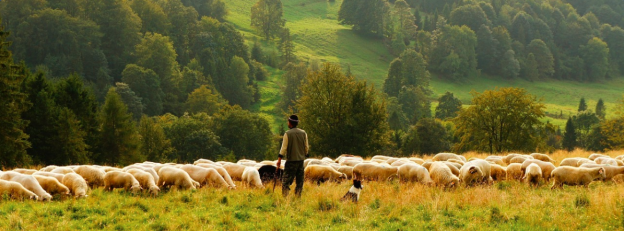Summary
If a competition for “most known psalm” was ever held, my guess is Psalm 23 would win hands-down. This beautiful psalm of David is popularly read and sung in Church services, at funerals, on music albums, and quoted in all forms of media. Many of us know the psalm’s basic themes, or even have it memorised.
David’s Psalm 23 is so appealing because we connect with the imagery of a shepherd taking care of his flock, even those of us who have spent too little time in the country! In Psalm 23, we see a picture of God, the Divine Shepherd, protecting and sustaining his flock. We see God’s tender guidance, God’s comfort, and God’s provision for his people.
Our passage explained
v1-2
The psalm begins with a picture of God’s tender guidance. David, using God’s covenantal name, describes God as “my shepherd” (v.1). This doubly indicates the close relationship between the believer and God – “The LORD” is used in the Old Testament to refer to God’s special relationship with his people, and secondly God is David’s, and our, shepherd.
Because God is our Divine Shepherd, he tenderly guides and provides. “I shall not want” (v.1). The Divine Shepherd ensures his sheep lack nothing. “He makes me lie down in green pastures. He leads me beside still waters” (v.2). The shepherd leads his flock to pastures where they are fed, and waters where they may drink and rest.
v3-4
This tender guidance and provision is for the benefit of his sheep. “He restores my soul. He leads me in paths of righteousness for his name’s sake” (v.3). The metaphor of God leading his sheep to green pastures, and beside restful, pleasant waters is explained in this verse. The feeding and resting is provided by God to restore David’s soul, attacked by the effects of sin in his own life and of the world around. Just like feeding, resting, and watering sheep revives them physically, so too the divine shepherd provides restoration for us in our whole self.
The guiding and providing is good for the sheep. Shepherds were responsible for leading sheep between meadows and water sources. God’s leading is always on a path of righteousness, leading us to live and act in ways which agree with God’s standards and bring glory and honour to God.
As shepherds guided their flocks they would also see to the comfort and protection of their sheep. This image is used in verse four, where David proclaims: “even though I walk through the valley of the shadow of death, I will fear no evil, for you are with me; your rod and your staff, they comfort me.” The Divine Shepherd leads his flock through the dark ravines of life, where threats wait to attack.
But the sheep do not fear being attacked and devoured by lions or other predators, because their Divine Shepherd is with them. God has his rod to hand, ready to fight and defeat wild animals who may attack the flock. The staff is in God’s other hand, to guide the sheep in the right direction, comforting them that they are being led to the next pasture.
v5-6
In the last part of Psalm 23, the imagery shifts from that of a shepherd to that of a host. Not only does God sustain and protect, but God provides for his people too. In David’s day, provision as a host also involved protection, which helps transition between the two images.
God the host “prepare[s] a table before me in the presence of my enemies; you anoint my head with oil; my cup overflows” (v.5). Despite the presence of enemies, God puts on a spread. He anoints his guest with oil, symbolising joy at his guest’s presence. God ensures that his guest’s cup of drink is always full to overflowing, receiving more than is needed because of God’s generosity.
This generosity helps ensure David’s belief in God’s continued faithfulness and generosity. “Surely goodness and mercy shall follow me all the days of my life, and I shall dwell in the house of the LORD forever” (v.6). David expresses his trust that God will continue to bless him and show his covenant faithfulness (here translated “mercy”) to David for all his days. He believes this will extend to enjoying God’s fellowship and presence forever.
Our passage applied
This psalm resonates so powerfully with believers throughout all ages because it is so clear in its teaching of the way in which God protects, sustains, and provides for us. It fills us with confidence in God; in God’s goodness to us, and in God’s care for us. We easily identify ourselves as sheep, led by God our Divine Shepherd to pastures green.
The intimacy of God as our caring shepherd was fulfilled most vividly in Christ’s life and death. Jesus is the Good Shepherd who laid down his life for us, his sheep (John 10). In Christ we see the care and goodness of God to us, his flock, blessed far beyond what we need because of God’s faithfulness and goodness to us.
Resources
Questions? Please contact us. Inspired? Come and worship with us on Sundays.

